|
|
|
Sort Order |
|
|
|
Items / Page
|
|
|
|
|
|
|
| Srl | Item |
| 1 |
ID:
133253
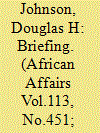

|
|
|
|
|
| Publication |
2014.
|
| Summary/Abstract |
ON 16 DECEMBER 2013 THE PRESIDENT of the Republic of South Sudan, Salva Kiir Mayardit, appeared on state television in military uniform to announce that he had successfully put down a coup attempt in the capital, Juba. The coup attempt was said to have been led by former Vice-President Riek Machar and several ex-cabinet ministers and officials of the ruling Sudan People's Liberation Movement (SPLM), including Madame Rebecca Nyanding de Mabior, the widow of the SPLM's first leader, John Garang. Eleven alleged coup plotters were arrested in their homes, but Riek Machar escaped from Juba, and, amid reports over the next few days of targeted killings of Nuer in Juba by men in uniform loyal to the President, the commanders of the 8th and 4th army divisions of the Sudan People's Liberation Army (SPLA) in Jonglei and Unity states announced their defection to Riek Machar and seized control of the state capitals of Bor and Bentiu. In telephone interviews from secure places Riek Machar denied that he had been involved in a coup but then urged the army to overthrow Salva Kiir and announced his plans to march on Juba.
|
|
|
|
|
|
|
|
|
|
|
|
|
|
|
|
| 2 |
ID:
087306
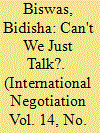

|
|
|
|
|
| Publication |
2009.
|
| Summary/Abstract |
The international community has been increasingly interested in the ways by which external actors help end civil conflicts. This study compares and contrasts the conflicts in Sri Lanka and Indonesia (Aceh) in order to understand why international intervention has failed in Sri Lanka but has been successful in Aceh. In Sri Lanka, the intensely fractured nature of domestic politics has been one of the most significant obstacles to successful peace talks. Although international intervention has become necessary to overcome the trust barriers between the two parties, it is seen as a threat to national sovereignty and therefore rejected. In contrast, the democratization process in Indonesia created new opportunities for peace. The political will of principal actors and their receptivity to external assistance enabled a peace agreement in 2005. The findings of this study show that both domestic political consensus and a supportive international environment, which protect the reputational concerns of the negotiating state, are necessary for resolving protracted ethnonational conflicts.
|
|
|
|
|
|
|
|
|
|
|
|
|
|
|
|
| 3 |
ID:
128979


|
|
|
|
|
| Publication |
2014.
|
| Summary/Abstract |
Civil conflict appears to be contagious-scholars have shown that civil wars in a state's neighborhood make citizens more likely to rebel at home. However, war occurs when both rebels and the state engage in conflict. How do state authorities respond to the potential for civil conflict to spread? We argue that elites will anticipate the incentive-altering effects of civil wars abroad and increase repression at home to preempt potential rebellion. Using a Bayesian hierarchical model and spatially weighted conflict measures, we find robust evidence that a state will engage in higher levels of human rights violations as civil war becomes more prevalent in its geographic proximity. We thus find evidence that states violate rights as a function of the internal politics of other states. Further, we argue authorities will act not to mimic their neighbors but rather to avoid their fate.
|
|
|
|
|
|
|
|
|
|
|
|
|
|
|
|
| 4 |
ID:
139212
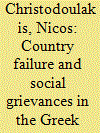

|
|
|
|
|
| Summary/Abstract |
The Civil War that took place in Greece between the Communist Party and the Centre-Right Government during 1946–1949 is examined from a political economy perspective. The cost of the conflict is measured as output forgone relative to what it would have prevailed had Greece followed a post-war recovery similar to that of other nations in Western Europe. A two-stage approach compares Nazi-occupied countries with neutral ones to assess the cost inflicted by Second World War, and then compares Greece with the former to estimate the impact of the civil conflict. A regional analysis finds that the political discontent was mainly shaped by pre-war socio-economic grievances, rather than being affected by contemporaneous deprivation or driven by class structure as hardliners of both sides preferred to present in pushing for an all-out confrontation. The failure to settle political rivalries and thus prevent the conflict is also discussed.
|
|
|
|
|
|
|
|
|
|
|
|
|
|
|
|
| 5 |
ID:
131345
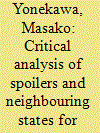

|
|
|
|
|
| Publication |
2014.
|
| Summary/Abstract |
Using Stephen J. Stedman's concept of spoilers as the main analytical framework, this paper offers insights into the failure of the United Nations peacekeeping mission in terms of civilian protection for a lengthy period in eastern Democratic Republic of the Congo. This failure arises not only from peacekeepers' failure to fully analyse the ambiguous status and relationship of spoilers and neighbouring states that are hostile to the peace process but also the United Nations' and peacekeepers' continuing support of spoilers and neighbouring states in three areas of implementation: military integration, military operations, and complacency regarding the chronic culture of impunity for key spoilers. Such support calls into question the neutrality of mediators and of the United Nations. The vicious cycle of violence created by spoilers and neighbouring states is likely to continue unless the United Nations develops appropriate preventive and proactive measures.
|
|
|
|
|
|
|
|
|
|
|
|
|
|
|
|
| 6 |
ID:
128861
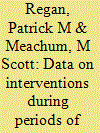

|
|
|
|
|
| Publication |
2014.
|
| Summary/Abstract |
Interventions into civil conflicts have been the focus of considerable research in recent years, but one of the limitations to many studies has been the emphasis on interventions once a conflict begins. While important, we know that states and other actors often take action prior to the onset of a civil war in hopes of diffusing - or exacerbating - a potentially volatile situation. To date, however, no one has been able to study these pre-conflict interventions because appropriate data did not exist. In this article we introduce a new dataset that fits this specific need. Our data identifies states that are at risk of civil war and codes instances of third-party military, economic, and diplomatic interventions. Based on forecasting models that derive risk scores for all states from 1957 to 2007, we are able to identify those states that are most at risk and provide detailed information about interventions that occur in those states. We include a brief empirical example that applies our new data on interventions to test for their effects on the likelihood of civil war or stability. Consistent with prior arguments regarding interventions during civil wars, we show that military interventions increase the risk of civil war onset, while economic and diplomatic interventions forestall that particular outcome. The limited example highlights just one of the potential uses for our new data. With it at hand, researchers will now have the ability to answer many of the vexing problems surrounding the processes that may or may not lead to civil war.
|
|
|
|
|
|
|
|
|
|
|
|
|
|
|
|
| 7 |
ID:
128959
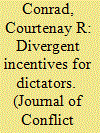

|
|
|
|
|
| Publication |
2014.
|
| Summary/Abstract |
Although they are arguably the worst violators of human rights, dictators sometimes commit to international human rights treaties like the United Nations Convention Against Torture (CAT) to appease their domestic opposition. Importantly, however, executives facing effective judiciaries must anticipate ex post costs that can arise when international treaties are likely to be enforced domestically. This suggests that one domestic institution-a political opposition party-may provide a dictator with incentives to commit to international human rights treaties and violate human rights, while another-an effective domestic judiciary-may constrain the dictator's ability to violate human rights and incentivize him to avoid international commitment. How do dictators make choices about commitment to human rights law and respect for human rights when they face conflicting domestic incentives? Furthermore, how do these divergent incentives affect compliance when dictators do commit to international treaties? In this article, I argue that the domestic incentives dictators face to support the CAT and engage in torture are moderated in countries with effective domestic judiciaries.
|
|
|
|
|
|
|
|
|
|
|
|
|
|
|
|
| 8 |
ID:
128242


|
|
|
|
|
| Publication |
2013.
|
| Summary/Abstract |
In recent Nigeria, the domestic terrorism of the Islamic group popularly known as 'Boko Haram' is hard to ignore. Almost everyday, television broadcast of the latest news, newspapers, magazines, and websites running and re-running pictures of dramatic and incessant acts of violence carried out by these ferocious group. Major initiatives to combat the nuclear proliferation and domestic terrorist threats posed by the 'Boko Haram' group have been launched by the Federal Government and international security institutions. In fact, considerable amount of money and political capital have been committed to new and continuing programmes to enhance nuclear security. Although, these and other efforts are worthy of support, it is not obvious that they reflect any clear ordering of priorities, or that they are being implemented with a sense of urgency. In order to correct this situation, this paper explicates the issue of Boko Haram domestic terrorism in Nigeria, taking an in-depth look at the historical antecedents, motivations, objectives and structures that can help in preventing them. This paper concludes with the advocacy of how citizens can assist in checking the menace of Boko Haram crises in the country in order to tackle these monstrous groups whose callous activities have become a hydra in Nigeria.
|
|
|
|
|
|
|
|
|
|
|
|
|
|
|
|
| 9 |
ID:
132148


|
|
|
|
|
| Publication |
2014.
|
| Summary/Abstract |
Over the past three years, the world has witnessed a surge of nonviolent resistance movements. Pictures of huge demonstrations in public squares have become a staple of international news broadcasts, and Time named "the protester" as its Person of the Year for 2011. These days, it seems that at any given moment, thousands of people are mobilizing for change somewhere in the world.
|
|
|
|
|
|
|
|
|
|
|
|
|
|
|
|
| 10 |
ID:
126565
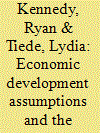

|
|
|
|
|
| Publication |
2013.
|
| Summary/Abstract |
Scholars have argued that oil resources lead to poor quality institutions and governance, which causes slower economic growth, an increased propensity for civil war, and other maladies. Such conclusions, however, rest on strong modernization assumptions that oil resources are unrelated or detrimental to the level of economic development. Utilizing a unique multilevel version of extreme bounds analysis (EBA), we find that oil's deleterious effects on governance are not well established. Instead, when we relax strong assumptions about the exogeneity of economic development and utilize more objective indicators of institutional quality, oil has a net positive impact on governance. Moreover, when accounting for endogeneity, there is little to suggest either an intervening or independent effect of poor governance on civil conflict in petro-states.
|
|
|
|
|
|
|
|
|
|
|
|
|
|
|
|
| 11 |
ID:
146926
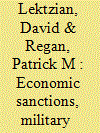

|
|
|
|
|
| Summary/Abstract |
Sanctions are designed to reduce the amount of resources available to the targeted actor and have the potential to be an effective tool for bringing disputing sides in a civil conflict to the bargaining table by altering incentives for continued fighting. Thus, there is reason to believe that sanctions can shorten the duration of civil conflicts. However, once sides in a conflict have moved to the use of violence to settle their dispute, it is hard for sanctions, in isolation, to impose enough cost to convince warring factions that settling a conflict has greater value than what could be expected from continued fighting. In this article, we argue that sanctions, in isolation, are unlikely to affect the duration of civil conflicts. However, when sanctions are combined with military interventions they can contribute to conflict management strategies resulting in shorter civil conflicts. We test our expectations empirically using data on civil conflicts from the Uppsala Conflict Data Program Armed Conflict Database and data on economic sanctions from the Threat and Imposition of Economic Sanctions Database. Our results suggest that the best hope for sanctions to shorten the duration of civil conflicts is if they are used as part of a comprehensive international response that includes institutional sanctions and military interventions.
|
|
|
|
|
|
|
|
|
|
|
|
|
|
|
|
| 12 |
ID:
129468
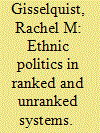

|
|
|
|
|
| Publication |
2013.
|
| Summary/Abstract |
This article explores how ethnic politics may operate differently in societies with "ranked" versus "unranked" ethnic systems, where ethnicity and class correlate closely versus very little. It focuses on two hypotheses suggested, but not tested, in Donald Horowitz's Ethnic Groups in Conflict. Their plausibility is explored in seven brief case studies of electoral politics in South America and Southern Africa. The analysis suggests that theories of ethnic politics that fail to take class into account are problematic for the study of ranked societies in particular.
|
|
|
|
|
|
|
|
|
|
|
|
|
|
|
|
| 13 |
ID:
126853
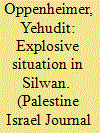

|
|
|
|
|
| Publication |
2011.
|
| Summary/Abstract |
If there is one area in the country where state control should develop, plan, manage and preserve, it is this area of the historic City of David." That is what the Israeli Antiquities Authority wrote in a letter to the attorney general. And they were not alone in this opinion. The City of David is located a few dozen meters from the Temple Mount, in the heart of the crowded Palestinian neighborhood of Silwan
|
|
|
|
|
|
|
|
|
|
|
|
|
|
|
|
| 14 |
ID:
139276
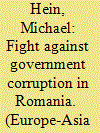

|
|
|
|
|
| Summary/Abstract |
The fight against political, especially government, corruption has dominated Romanian political discourse for many years. However, the vast majority of the political elite have continuously opposed the prosecution and conviction of defendants of corruption crimes. After a long constitutional conflict that seriously inhibited the fight against government corruption between 2006 and 2009, law enforcement agencies finally began to experience some success. Nevertheless, the extent of government corruption has remained consistently high. This article analyses the struggles that have occurred between 2004 and 2013 in the fight against government corruption in Romania and particularly examines the interplay between formal and informal factors in this field.
|
|
|
|
|
|
|
|
|
|
|
|
|
|
|
|
| 15 |
ID:
172193
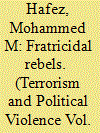

|
|
|
|
|
| Summary/Abstract |
Why do rebels kill each other? When confronting a formidable regime, rebels often descend into warring factionalism rather than forge unity across their ranks to reap the advantages of cooperation. This article tackles the puzzle of inter-rebel fratricide. It explores power and resource competition arguments, and contrasts them with ideological mechanisms that can drive inter-rebel violence. It argues that ideological extremity is central to rebel fratricide. Rebel organizations with common ideological origins can still compete with each other based on their degree of centrism and extremism, making them ideologically distant. This proximity-distance paradox makes their cohabitation mutually threatening. Ideological challengers from the same family tree are particularly threatening to one’s group cohesion, and if successful, guarantee one’s political marginalization within the broader movement. Extremist groups are likely to respond to these threats with fratricide, while ideologically centrist ones will rely on other strategies such as balancing, outbidding, or defecting to manage their rivalries. Algeria’s civil war, 1992–2002, is a plausibility probe case study that illustrates these causal mechanisms. The study contributes to a burgeoning literature on the role of ideology in armed civil conflicts.
|
|
|
|
|
|
|
|
|
|
|
|
|
|
|
|
| 16 |
ID:
088359
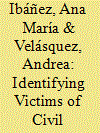

|
|
|
|
|
| Publication |
2009.
|
| Summary/Abstract |
Given that forced migration subjects households to extremely vulnerable conditions, the need to design particular policies for displaced populations is unquestionable. However, forced displacement poses several challenges to policymakers. In connection with low-intensity conflicts, such as in the case of Colombia, the main obstacle concerns the identification of households' victims of forced migration, so as to know to whom one should funnel aid. In such cases, inasmuch as victims migrate individually and tend to spread throughout a territory, identifying victims is difficult and channeling aid through supply-driven mechanisms is prohibitively expensive. To locate the households' victims of low intensity conflicts, an alternative - one adopted by the Colombia government - is to provide aid through demand-driven programs. This article evaluates whether demand-driven approaches aimed at assisting displaced households do in fact reach the entire displaced population. The study employs a survey applied to 1,553 households located in 48 Colombian municipalities. The authors identify to what extent a demand-driven approach excludes particular groups of households within the displaced population, examine what household characteristics determine the decision to declare one's eligibility for and final registration in RUPD, and analyze whether the exclusion of some groups of households is caused by the behavior of the relevant displaced households or by the deliberate targeting of these households by government offices. Results reveal that the exclusion of households from Colombia's RPUD program is mainly caused by lack of information regarding RUPD, with institutional determinants playing a lesser role.
|
|
|
|
|
|
|
|
|
|
|
|
|
|
|
|
| 17 |
ID:
137160
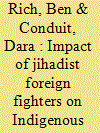

|
|
|
|
|
| Summary/Abstract |
Jihadist foreign fighters have become common in civil conflicts in Muslim countries. While research exists on the impact they have upon returning home, less attention has been given to their influence on the opposition cause that they mobilize in support of. This article looks at the impact that jihadist foreign fighters on the Chechen and Syrian resistance causes, evaluating their influence on oppositional cohesion and ideology, domestic and international perceptions of the movements, and on governmental narratives regarding the conflicts the foreign fighters engage in. It is concluded that foreign fighters have overwhelmingly damaged the Chechen and Syrian opposition movements, making the likelihood of opposition success more remote.
|
|
|
|
|
|
|
|
|
|
|
|
|
|
|
|
| 18 |
ID:
127008
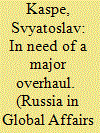

|
|
|
|
|
| Publication |
2013.
|
| Summary/Abstract |
Twenty years after it was established, Russia's post-Soviet political system is still experiencing problems. The system is subject to such disorder and dysfunction that even the most loyal government official cannot help but notice. Russia's political system does not ensure that the objectives for which it was designed can be accomplished. The system's capacity to accumulate resources of various types (material, ideological, and human) and to distribute them is weak and continues to deteriorate, while the system's expenses are exorbitant. Moreover, it is becoming increasingly difficult to control the political system. Public trust in the government and other political structures is very low and the relatively high ratings of individual politicians cannot make up for it. The very same ratings, which in essence form the only bastion of the regime, face the risk of a sudden collapse.
We have almost forgotten that politics should have a value component (the fascination with perestroika proved to be short-lived). The absence of value guidelines beyond accounts of benefits and costs turns politics into a nasty parody of itself and deprives it of power and functionality.
|
|
|
|
|
|
|
|
|
|
|
|
|
|
|
|
| 19 |
ID:
127034
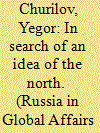

|
|
|
|
|
| Publication |
2013.
|
| Summary/Abstract |
The Republic of Belarus emerged as a sovereign political entity on the world political map more than twenty years ago. The breakup of the Soviet Union made it possible for the constituent republics to acquire an independent status, and for the COMECON and Warsaw Pact countries, shrug off Soviet protectorate. In contrast to most of these states, Belarus has built its own economic and political model and retained a truly independent political stance, even though it has found itself sandwiched between geopolitical giants in the West and in the East. Belarus as a state in its own right is an established fact of history that has to be taken into account by its European neighbors and overseas strategists who seek to use its special place and role to their own advantage.
|
|
|
|
|
|
|
|
|
|
|
|
|
|
|
|
| 20 |
ID:
117522
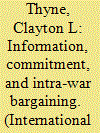

|
|
|
|
|
| Publication |
2012.
|
| Summary/Abstract |
This article considers how governmental variations affect the duration of civil conflicts. Recent work suggests that war termination is likely when competing actors gain information about the power balance and are able to credibly commit to war-ending agreements. I focus on how the strength and stability of executives impact these factors. Regarding information, power consolidation within the government reduces the number of people who must agree on a settlement, which should shorten civil conflicts. Stable leadership should likewise shorten conflicts by making it harder for potential spoilers to derail war-ending agreements, helping minimize credibility problems. This argument is tested by examining how variations in institutional design (executive constitutional and legislative power), political strength (ideological fragmentation and polarization), and stability (leadership tenure) affect the duration of civil conflicts from 1946 to 2004. The results suggest that powerful and stable executives are indeed well equipped to end civil conflicts.
|
|
|
|
|
|
|
|
|
|
|
|
|
|
|
|
|
|
|
|
|